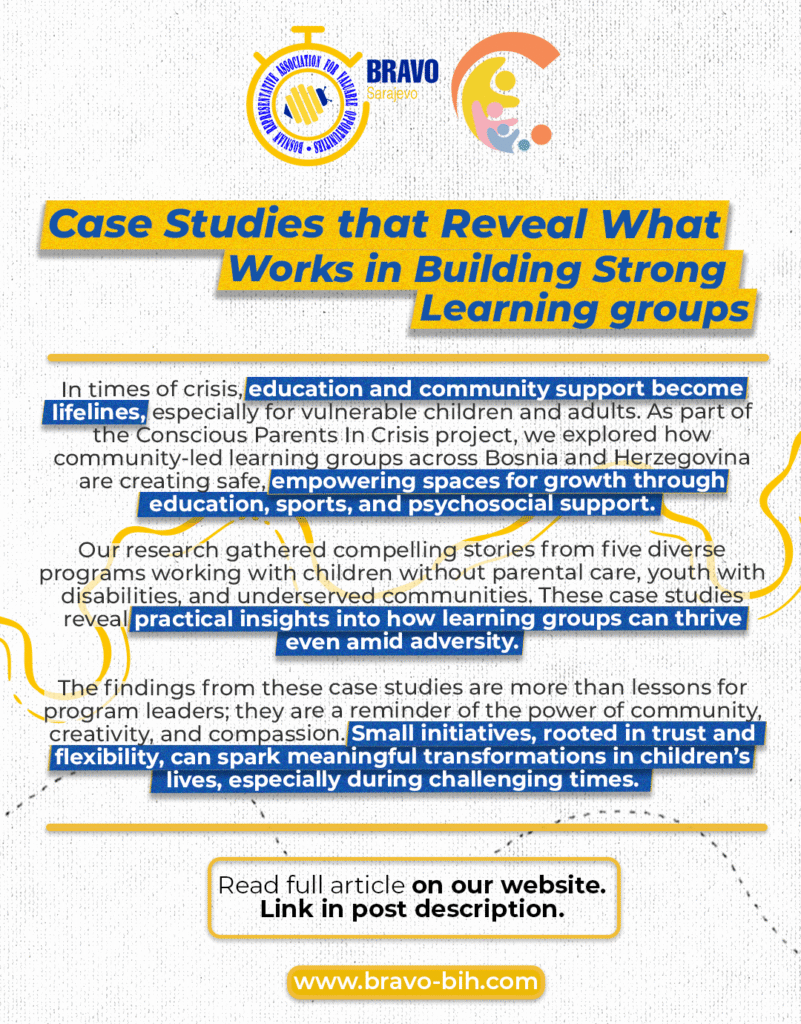
In times of crisis, education and community support become lifelines, especially for vulnerable children and adults. As part of the Conscious Parents In Crisis project, we explored how community-led learning groups across Bosnia and Herzegovina are creating safe, empowering spaces for growth through education, sports, and psychosocial support.
Our research gathered compelling stories from five diverse programs working with children without parental care, youth with disabilities, and underserved communities. These case studies reveal practical insights into how learning groups can thrive even amid adversity.
Key Lessons from the Field
- One Size Doesn’t Fit All
Success starts with understanding that every group is unique. Whether it’s a tutoring program or a sports club, adapting the size, structure, and activities to meet the emotional readiness and learning needs of participants is crucial. Smaller groups or flexible formats help participants engage comfortably, fostering better outcomes.
- Inclusion Is a Journey, Not Just a Policy
True inclusion grows over time. Programs that offer individualized support, such as one-on-one mentoring or opportunities to transition gradually into group settings, create a safer environment. This approach helps children and youth build confidence and feel genuinely included — laying the foundation for lasting change. - Trust Builds the Strongest Foundations
Volunteers in these programs are more than just facilitators, they become trusted mentors and role models. Their empathy, consistency, and support create an environment where learning flourishes. Even volunteers without formal professional training can have a profound impact when they approach their roles with care.
Why These Insights Matter
The findings from these case studies are more than lessons for program leaders; they are a reminder of the power of community, creativity, and compassion. Small initiatives, rooted in trust and flexibility, can spark meaningful transformations in children’s lives, especially during challenging times.
As we look ahead, these lessons will guide the next generation of learning group leaders across Bosnia and Herzegovina — and beyond — showing that even in crisis, communities can come together to nurture growth, resilience, and hope.
MORE ABOUT THE PROJECT
The CPC project is designed to empower parents to start and manage learning groups effectively, providing an alternative or supplement to traditional public education. It’s particularly relevant in crisis situations where conventional educational structures may falter. The project envisions learning groups as small, organized communities that deliver regular educational content outside the public system. Examples include small private school communities in Hungary that follow the national curriculum but employ alternative teaching methods. Similar home-schooling communities exist in Portugal and Germany.
The project’s operations span several phases, beginning with preparations like kick-off events and local knowledge transfer seminars. The initial stages focus on data collection through research on existing student groups across various countries. Each partner country is tasked with examining specific aspects of these groups to create a collection of best practices.
These practices will then be synthesized into a comprehensive Learning Group Management (LGM) methodology. The final output will be a training manual alongside facilitator training sessions. The methodology will cover six key themes ranging from building a learning community to integrating digital tools and supporting children with special needs.
The project also involves creating a robust digital presence, including a project website and social media engagement to foster a wider community interaction and dissemination of project results. Fieldwork will follow, with local and international training sessions for facilitators who will then train parents directly. The aim is to make these learning groups viable and sustainable options for parents looking to supplement their children’s education or provide a solid alternative during disruptive times.
Ultimately, the project not only addresses the educational needs of children but also equips parents with the necessary tools and knowledge to lead these initiatives effectively. The focus on a supportive learning environment, blended learning methods, and inclusive education practices underscores the project’s commitment to a holistic educational approach. This initiative is aligned with the EU’s educational objectives and offers a practical response to the growing need for adaptable educational formats in light of global challenges like climate change and societal disruptions.
